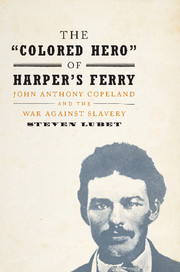Book contents
- Frontmatter
- Dedication
- Contents
- Acknowledgments
- Author's Note
- Prologue
- 1 The Frozen River
- 2 A Good Abolition Convention
- 3 The Colony and the College
- 4 “A Most Well Disposed Boy”
- 5 “I Have Found Paradise”
- 6 “My Object in Coming to Oberlin”
- 7 Not a Fugitive Was Seized
- 8 The New Marshal
- 9 “Recital of the Wrong and Outrage”
- 10 Wack's Tavern
- 11 A Brace of Pistols
- 12 The Oberlin Rescue
- 13 “The Black Mecca”
- 14 The Felons' Feast
- 15 Votaries of the Higher Law
- 16 “The Bravest Negroes”
- 17 The Invisibles
- 18 The War Department
- 19 Hall's Rifle Works
- 20 “His Negro Confession”
- 21 Nothing Like a Fair Trial
- 22 An Abolition Harangue
- 23 Only Slave Stealing
- 24 This Guilty Land
- 25 The Colored American Heroes
- Epilogue
- Notes
- Bibliography
- Index
2 - A Good Abolition Convention
Published online by Cambridge University Press: 05 July 2015
- Frontmatter
- Dedication
- Contents
- Acknowledgments
- Author's Note
- Prologue
- 1 The Frozen River
- 2 A Good Abolition Convention
- 3 The Colony and the College
- 4 “A Most Well Disposed Boy”
- 5 “I Have Found Paradise”
- 6 “My Object in Coming to Oberlin”
- 7 Not a Fugitive Was Seized
- 8 The New Marshal
- 9 “Recital of the Wrong and Outrage”
- 10 Wack's Tavern
- 11 A Brace of Pistols
- 12 The Oberlin Rescue
- 13 “The Black Mecca”
- 14 The Felons' Feast
- 15 Votaries of the Higher Law
- 16 “The Bravest Negroes”
- 17 The Invisibles
- 18 The War Department
- 19 Hall's Rifle Works
- 20 “His Negro Confession”
- 21 Nothing Like a Fair Trial
- 22 An Abolition Harangue
- 23 Only Slave Stealing
- 24 This Guilty Land
- 25 The Colored American Heroes
- Epilogue
- Notes
- Bibliography
- Index
Summary
LIKE JOHN PRICE, JOHN BROWN was freezing during the winter of 1855–56, which he spent huddled with family members on the plains of Kansas. He had arrived in October, just a few months ahead of the “bitterly cold and cutting winds” that would keep everyone “shivering over their little fires” until spring. Five of Brown's sons had arrived earlier that year, among the thousands of Free-state emigrants who moved to Kansas in order to resist the imposition of slavery on the newly created territory. Once the brothers had established themselves in a settlement dubbed Brown's Station, not far from the town of Osawatomie, John Brown, Jr., wrote to his father about the virtues and challenges of life in Kansas, emphasizing both the beauty of the prairie and the depredations of the Missourians who were determined to spread slavery by violent means. John, Jr., was discouraged by the passivity of the other Free-staters, calling them “abject and cowardly.” He asked his father to provide the five brothers with arms, including two revolvers, a rifle, and a bayonet for each man. “Every day strengthens my belief that the sword … will soon be called upon to give its verdict,” he wrote.
In the words of biographer Oswald Garrison Villard, the appeal for arms was one that “Brown could not have resisted had he desired to.” In the company of another son and a son-in-law, he headed west with, as he put it, a wagon load of “Guns[,] Revolvers, Swords, Powder [and] Caps” that he obtained from supporters in Ohio. The overland journey took the better part of two months, much of it covered on foot in order not to overtax his “nice young horse.” In Kansas, he found his sons and their families sick with fever and nearly destitute, living in tents and makeshift cabins. Of the eight adult men in the settlement, only one was in good health.
- Type
- Chapter
- Information
- The 'Colored Hero' of Harper's FerryJohn Anthony Copeland and the War against Slavery, pp. 17 - 23Publisher: Cambridge University PressPrint publication year: 2015



